|
|
|
Sort Order |
|
|
|
Items / Page
|
|
|
|
|
|
|
| Srl | Item |
| 1 |
ID:
090897
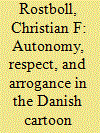

|
|
|
|
|
| Publication |
2009.
|
| Summary/Abstract |
Autonomy is increasingly rejected as a fundamental principle by liberal political theorists because it is regarded as incompatible with respect for diversity. This article seeks, via an analysis of the Danish cartoon controversy, to show that the relationship between autonomy and diversity is more complex than often posited. Particularly, it asks whether the autonomy defense of freedom of expression encourages disrespect for religious feelings. Autonomy leads to disrespect for diversity only when it is understood as a character ideal that must be promoted as an end in itself. If it by contrast is understood as something we should presume everyone possesses, it provides a strong basis for equal respect among people from diverse cultures. A Kantian conception of autonomy can justify the right to freedom of expression while it at the same time requires that we in the exercise of freedom of expression show respect for others as equals.
|
|
|
|
|
|
|
|
|
|
|
|
|
|
|
|
| 2 |
ID:
138913


|
|
|
|
|
| Summary/Abstract |
The Lee Myung-bak government’s response to the sinking of the South Korean warship Cheonan in March 2010 was a hard-line policy that met with widespread public doubt and criticism. His conservative government reacted to critics with suppression of free speech and use of state power to control the media. As a result, international ratings of press freedom and Internet freedom for South Korea were downgraded. The government relied on national security rhetoric; however, its primary legal tools were not the National Security Law but rather criminal defamation and broadcasting and Internet regulations. I discuss some factors that make South Korean democracy vulnerable to erosion of press freedom, including the enduring influence of the Cold War, fragility of liberalism, and the lack of executive constraints.
|
|
|
|
|
|
|
|
|
|
|
|
|
|
|
|
| 3 |
ID:
182271


|
|
|
|
|
| Summary/Abstract |
Terrorist threats and actions are as real to New Zealand as they are to other nations. There are those from outside our borders who wish us ill and may use terror, or the threat of terror, to advance their aims. In addition, some within our borders are so disaffected as to use the instruments of terror to further their ends and threaten our collective security. Countering terrorism requires an understanding of the nature of the threat. A number of elements need to be co-ordinated and timely counter-action is essential. An effective legislative framework and administrative resources are vital prerequisites.
|
|
|
|
|
|
|
|
|
|
|
|
|
|
|
|
| 4 |
ID:
188086


|
|
|
|
|
| Summary/Abstract |
Following the rise in far-right inspired terrorist attacks globally, social media and electronic communications companies have been criticized, mainly by politicians, for allowing far-right extremist content to be available. This article is a comparative legal study focusing on Australia, Canada, New Zealand, the U.K., and the U.S.’ legal provisions regarding the right to freedom of expression, hate crime, and proscription of terrorist organizations. This study found a disparity in the form of expression protected under this right. This disparity widens further when related to hate crime and proscribing groups as terrorist organizations. As such, social media and communications companies have difficulty setting at global level a baseline in determining whether content is legitimate commentary or is extremism promoting or inciting hatred and violence. The article concludes with a recommendation for how states can provide comparable legislation on hate crime as they have done in relation to Islamist inspired extremism. This will assist social media and communications companies in removing content and suspending accounts. These companies are not the guardians of freedom of expression, that is the role of states’ legislatures and judiciary.
|
|
|
|
|
|
|
|
|
|
|
|
|
|
|
|
| 5 |
ID:
142444


|
|
|
|
|
| Summary/Abstract |
For Palestinians, social media has become the number-one source of news in recent years. Most of the events that take place socially and politically are reported and brought to the Palestinian people by “citizen journalists.” This situation is problematic, especially because most of those “reporters” are either ordinary people who have no journalism experience or political activists who are using social media as a platform to express their opinions.
|
|
|
|
|
|
|
|
|
|
|
|
|
|
|
|
| 6 |
ID:
145341
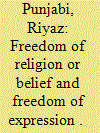

|
|
|
| 7 |
ID:
099170
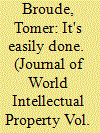

|
|
|
|
|
| Publication |
2010.
|
| Summary/Abstract |
This article examines the implications of the World Trade Organization (WTO) China-Intellectual Property Rights Enforcement case for the relationship between human rights law and trade-related intellectual property law. It shows that, despite the theory whereby international trade law can spontaneously support the freedom of expression and possibly other human rights, the parties and the panel were, in practice, oblivious to the human rights context of the dispute. In the WTO, human rights considerations will be integrated with international trade law (and intellectual property law within it) only if a party makes explicit arguments to this effect, and a panel opts to consider such arguments on their merits, not through issue avoidance.
|
|
|
|
|
|
|
|
|
|
|
|
|
|
|
|
| 8 |
ID:
129893
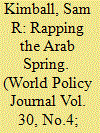

|
|
|
| 9 |
ID:
160430
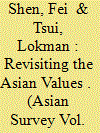

|
|
|
|
|
| Summary/Abstract |
This study aims to disentangle the empirical relationships between Asian values and attitudes toward freedom of expression in Asia. Findings from our multinational survey suggest no obvious relationship between Asian values and support for freedom of expression at the country level. At the individual level, the data suggest a positive relationship between Asian values and support for freedom of expression when Asian values are treated as a single concept.
|
|
|
|
|
|
|
|
|
|
|
|
|
|
|
|
| 10 |
ID:
159859
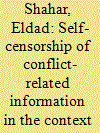

|
|
|
|
|
| Summary/Abstract |
Self-censorship is of great importance in societies involved in intractable conflict. In this context, it blocks information that may contradict the dominant conflict-supporting narratives. Thus, self-censorship often serves as an effective societal mechanism that prevents free flow and transparency of information regarding the conflict and therefore can be seen as a barrier for a peacemaking process. In an attempt to understand the potential effect of different factors on participants’ willingness to self-censor (WSC) conflict-related information, we conducted three experimental studies in the context of the Israeli–Palestinian conflict. Study 1 revealed that perception of distance from potential information recipients and their disseminating capabilities lead to higher WSC. Study 2 replicated these results and also showed that fulfilling different social roles has an effect on the WSC. Finally, study 3 revealed that the type of information has a major effect on WSC.
|
|
|
|
|
|
|
|
|
|
|
|
|
|
|
|
| 11 |
ID:
100861


|
|
|
|
|
| Publication |
2010.
|
| Summary/Abstract |
Hate groups are often thought to reveal a paradox in liberal thinking. On the one hand, such groups challenge the very foundations of liberal thought, including core values of equality and freedom. On the other hand, these same values underlie the rights such as freedom of expression and association that protect hate groups. Thus a liberal democratic state that extends those protections to such groups in the name of value neutrality and freedom of expression may be thought to be undermining the values on which its legitimacy rests. In this paper, I suggest how this apparent paradox might be resolved. I argue that the state should protect the expression of illiberal beliefs, but that the state (along with its citizens) is also obligated to criticize publicly those beliefs. Distinguishing between two kinds of state action-coercive and expressive-I contend that such criticism should be pursued through the state's expressive capacities in its roles as speaker, educator, and spender. Here I extend the familiar idea that law, to be legitimate, must be widely publicized; I contend that a proper theory of the freedom of expression obligates the legitimate state to publicize the reasons that underlie rights, in particular reasons that appeal to the entitlement of each citizen subject to coercion to be treated as free and equal. My theory of freedom of expression is thus "expressive" in two senses: it protects the entitlement of citizens to express any political viewpoint, and it emphasizes a role for the state in explaining these free-speech protections and persuading its citizens of the value of the entitlements that underlie them.
|
|
|
|
|
|
|
|
|
|
|
|
|
|
|
|
|
|
|
|
|